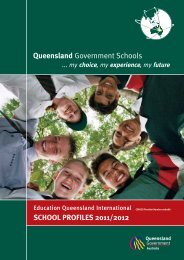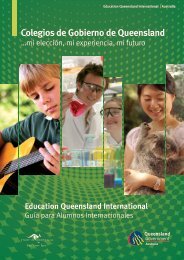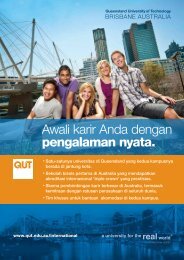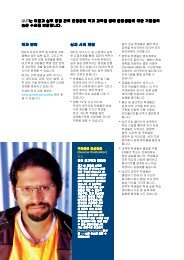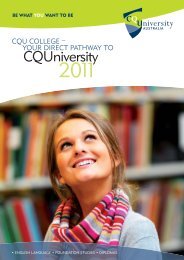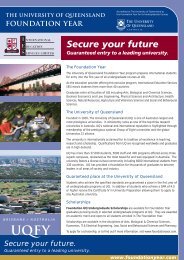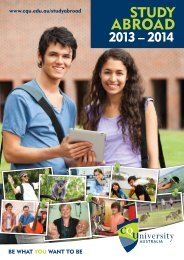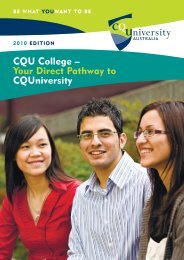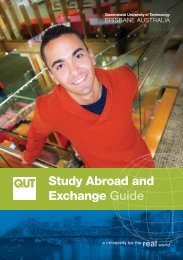UNDERgRADUATE PROSPECTUS - Study Brisbane
UNDERgRADUATE PROSPECTUS - Study Brisbane
UNDERgRADUATE PROSPECTUS - Study Brisbane
- No tags were found...
You also want an ePaper? Increase the reach of your titles
YUMPU automatically turns print PDFs into web optimized ePapers that Google loves.
Agriculture, Animals, Food and Environment<br />
As a result, modern equine management demands<br />
a depth of scientific knowledge and skills with an<br />
intensive and individual focus.<br />
Marine Resources<br />
Marine Resources encompasses studies directed<br />
towards the management, catching or growing,<br />
processing, marketing, and export of marine/<br />
fisheries resources. Technical, economic, social,<br />
legal, and managerial factors are considered.<br />
Plant Studies<br />
Plant Studies provides a foundation for<br />
understanding how plants grow and how they can<br />
be managed in agricultural or horticultural production<br />
systems. Courses cover the principles and practices<br />
of plant production, as well as plant health and soil<br />
management. Plant studies can lead to Level 3<br />
(degree) studies in agronomy (crops and pastures)<br />
and horticultural production (fruit, vegetable,<br />
nursery crops), as well as lifestyle horticulture (urban<br />
landscapes and environmental horticulture).<br />
Wilderness Reserves and Wildlife<br />
Whether managing national parks, marine parks,<br />
conservation areas, nature reserves, recreation<br />
areas, or other protected areas and natural<br />
resources, in this specialty you will learn about<br />
educating visitors; patrolling parks and waterways<br />
for law enforcement; surveying and monitoring<br />
the condition of natural and culturally significant<br />
features; protecting endangered animals and<br />
plants; assisting in research projects and wildlife<br />
management projects; supervising and coordinating<br />
fire management, weed eradication and pest-control<br />
programs; and maintaining parks in areas such as<br />
campgrounds and walking tracks.<br />
Career opportunities<br />
Depending on your specialisation: agricultural<br />
production; riding instructor; strapper or<br />
stablehand; horse handler; technical salesperson<br />
with stockfeed and saddlery firms; equestrian<br />
journalist; assistant in horse stud; veterinarian<br />
assistant and senior groom in competition<br />
stable; biosecurity officer (stock inspectors) with<br />
government agencies; quarantine officer and<br />
in stock and station agent roles; park ranger;<br />
environmental officer; Landcare coordinator;<br />
biodiversity officer; nature guide; marine resource<br />
organisations; timber-harvesting; sawmill quality<br />
control; boating and fisheries patrol officer and<br />
technical officer; food processor; agricultural or<br />
horticultural producer; and work in agribusiness<br />
firms, conservation (e.g., Landcare), tourism,<br />
ecotourism, nurseries, floriculture, or marine<br />
resource organisations.<br />
International contact details<br />
International Student Advisor<br />
Online: www.uq.edu.au/international/enquiry<br />
Phone: within Australia (free call): 1800 671 980<br />
Outside Australia: +61 3 8676 7004<br />
Bachelor of<br />
Applied Science<br />
Program code 2240<br />
Location Gatton, St Lucia<br />
Commencement semester 1, 2<br />
Duration Three years full-time<br />
Delivery mode External/Internal<br />
Admission requirements Food Science and<br />
Nutrition: Year 12 English, Chemistry and<br />
Mathematics B. Integrated Resource Management:<br />
Year 12 English and Mathematics A, B or C.<br />
Exercise and Nutrition Sciences: Year 12 English,<br />
plus one of either Biology, Chemistry or Physics.<br />
Other majors: Year 12 English (see page 92)<br />
Honours Available as an additional year of study<br />
Program outline<br />
Applied science is the science of applying<br />
knowledge from one or more natural scientific<br />
fields to practical problems. The study of applied<br />
science at UQ will provide you with not only a broad<br />
understanding of a variety of scientific principles,<br />
but also the skills to apply your knowledge to solve<br />
problems in a variety of situations. This is a vital<br />
skill that employers seek, and therefore will be of<br />
particular advantage when you enter the workforce.<br />
The Bachelor of Applied Science will provide you<br />
with a broad background in basic sciences. The<br />
degree offers a flexible three-year program with a<br />
diverse range of specialisations, depending on your<br />
career aspirations, making it possible to enter into a<br />
wide range of industries.<br />
You can tailor your study by selecting either<br />
one extended major or two single majors, which<br />
combine two areas of interest.<br />
Placement courses<br />
You must complete 30 working days of approved<br />
industry practice work experience in order to<br />
graduate, which will give you an opportunity to gain<br />
valuable practical experience in a real workplace<br />
setting.<br />
Additional information<br />
With the exception of the Food Science and<br />
Nutrition, Integrated Resource Management,<br />
Veterinary Technology, and Exercise and Nutrition<br />
Sciences majors or extended majors, all majors are<br />
offered in internal and external modes.<br />
You can not be admitted to the Veterinary<br />
Technology extended major until the fourth semester<br />
of the Bachelor of Applied Science. There is a quota<br />
of 30 students admitted to fourth semester. The final<br />
year of the Veterinary Technology extended major is<br />
available in internal mode only.<br />
As an internal student undertaking the Equine<br />
Science extended major, you will, at some stage,<br />
require your own equitation horse. Agistment is<br />
available on campus.<br />
Majors<br />
Animal and Plant Biosecurity<br />
Safeguarding Australia’s animal and plant resources<br />
through adequate security and quarantine is<br />
the basis for the Animal and Plant Biosecurity<br />
major. If you would like to work in biosecurity<br />
and quarantine roles, such as in the Australian<br />
Quarantine and Inspection Service (AQIS) or<br />
Customs, you can complete the three-year Bachelor<br />
of Applied Science with a major in Animal and<br />
Plant Biosecurity. You can further boost your career<br />
options by combining your studies with business,<br />
animals, or plants, depending on your interests.<br />
Animal Science<br />
Animal Science is concerned with the scientific<br />
and business aspects of the production of beef<br />
cattle, dairy cattle, horses, poultry, sheep and/<br />
or pigs. Animal scientists research and distribute<br />
newly discovered information regarding the biology<br />
and management of production animals. Animal<br />
scientists also work to apply their knowledge to<br />
benefit the general public through the efficient,<br />
humane and environmentally responsible use of<br />
animals for food, companionship, and recreation.<br />
Conservation Management<br />
The Conservation Management major focuses<br />
on resource management within a conservation<br />
framework. It provides key skills and perspectives<br />
needed to achieve conservation goals within the<br />
broader landscape, and addresses both policy and<br />
practical aspects of conservation management.<br />
Equine Science<br />
Equine Science is a specialised area of animal<br />
science that involves horses to study areas such as<br />
nutrition, reproduction, exercise physiology, health<br />
and rehabilitation, as well as welfare and behaviour.<br />
This knowledge is then applied to improve the<br />
management, performance, and welfare of both<br />
the leisure horse and the equine athlete. Equine<br />
Science also includes areas of study that explore<br />
the interaction of horse and rider.<br />
Exercise and Nutrition Sciences<br />
Exercise and Nutrition Sciences as a major<br />
recognises the strong link between exercise and<br />
nutrition, and their role in the prevention and<br />
treatment of preventable illnesses, chronic disease,<br />
some cancers, and obesity. This major focuses<br />
on developing a broad understanding of the<br />
human body, and introduces you to how the body<br />
moves and ways to enhance wellness and human<br />
performance through exercise and nutrition.<br />
You will study a breadth of courses in human<br />
movement sciences (biomechanics, motor control,<br />
sport and exercise physiology) and nutrition (food<br />
science, food and society, and nutrition and<br />
disease). You will have the flexibility to tailor your<br />
program to meet your specific interests and career<br />
aspirations.<br />
This major is a recommended pathway into the<br />
Master of Dietetic Studies, and is also an excellent<br />
entry point for other postgraduate programs,<br />
including exercise science, physiotherapy, sports<br />
coaching, or graduate entry medicine. You can<br />
conduct research in areas including biomechanics,<br />
exercise physiology, motor control, nutrition, and<br />
sport science.<br />
Food Science and Nutrition<br />
(extended major available)<br />
Food science and nutrition covers all aspects of the<br />
food system, from farm to fork. The food system is<br />
not only concerned with on-farm production, offfarm<br />
food processing, and distribution of produce<br />
for sale, but also the selection and consumption of<br />
food by consumers, including the effects of food on<br />
their health.<br />
Food science covers the physical nature and<br />
chemical composition of food, which enables us<br />
to understand how and why food behaves under<br />
different conditions of processing and storage.<br />
We use this information to improve the safety and<br />
quality of food, as well as extend the range of<br />
products available.<br />
The science of nutrition studies the effects of<br />
dietary nutrients on growth, development, health<br />
and well-being in the population. It also examines<br />
the psychological, sociological, and cultural factors<br />
that influence food choice, with a particular focus<br />
on the consequences for health. Food Science and<br />
Nutrition is available as a single or extended major.<br />
Integrated Resource Management<br />
(extended major available)<br />
We live in a most exciting world and are faced with<br />
complex resource management issues central to<br />
Australia and the world’s future, such as water<br />
management, climate change, persistent poverty,<br />
economic globalisation, environmental degradation,<br />
and social and political conflict. This field of study<br />
will introduce you to the need in industry for<br />
integrating natural resource science with economics<br />
and people/social issues in finding sustainable<br />
solutions to these complex problems.<br />
UNDERGRADUATE <strong>PROSPECTUS</strong> FOR INTERNATIONAL STUDENTS 2012<br />
41




